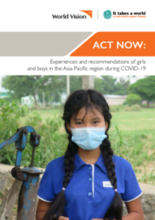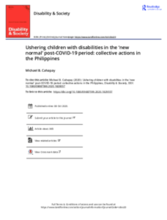Effective
NO SOURCE GIVEN
Social Welfare Spending
NO SOURCE GIVEN
Alternative Care Policy in Line with the 2009 Guidelines
MJF, 2018
i
The principal creed of alternative care provision revolves around the Alternative Care of Children Act (2016) purports in Section 5 (b) the agencies are "to support efforts to keep children in, or return to the care of their family or, failing this, to find another appropriate and permanent solution".
Centralised Authority on Adoption
HCCH, 2020
i
ICAB - Inter Country Adoption Board
Commitment to Deinstitutionalistion
3rd and 4th CRC Periodic Reports, 2007.
i
In 2004, DSWD issued a Memorandum Circular No 22. "Policy on the De-institutionalization of Children".
Comprehensive Child Protection Law
GSSWA, 2019
i
The Philippines ratified the UNCRC in 1990. In the child protection field alone, there are several main laws that provide a mandate for the social services workforce: the Special Protection of Children against Child Abuse, Exploitation and Discrimination Amendment Act (2003); the Anti-Trafficking in Persons Act (2003); the Anti-Violence against Women and their Children Act (2004); the Juvenile Justice and Welfare Act (2006); the Anti-Child Pornography Act (2009); the Children’s Emergency Relief and Protection Act (2016); and Children in Situations of Armed Conflict Act (2011). These laws and their continued development are the focus of policy debates in the fields of child protection, education and mental health.
Continuum of Alternative Care Services Available
NO SOURCE GIVEN
Data System
NO SOURCE GIVEN
Existence of a Regulatory Body and Regulatory System
MJF, 2018
i
"All NGOs that identify as Social Welfare Development Agencies (SWDAs) are required to register with the DSWD. Social Welfare Development Agencies are defined as Peoples Organizations (POs), such as organizations or associations for children, youth, women, senior citizens and people with disabilities.The accreditation of residential care facilities by the Standards Bureau shall have a validity period with a maximum of 5 years." (DSWD Administrative Order No. 11)
Gatekeeping Mechanism/Policy
MJF, 2018
i
"Reinforcing the principle of family preservation, the Republic Act 9523 stipulates Section 3 (2) “proof that efforts were made to locate the parent(s) or any known relatives of the child” before permanent care solution, likely adoption i.e. filing a petition for certificate declaring a child legally available for adoption (CDCLAA) is explored for the child. Enabling families who abandoned as well as surrendered children a grace period to resolve their issues for the eventual return of their child back to the family home. DSWD Administrative Order No. 11 reiterated admission to residential care facilities for children should be the last resort and should consider a time frame on the maximum duration of their stay in the facility."
Means of Tracking Progress with Reforms
DSWD, 2020
i
"The ABSNET (Area-Based Standards Network) is also seen as an effective strategy with the end goal of institutionalising collaboration with the SWAs that are registered, licensed and accredited by DSWD, which constitute the intermediaries for social welfare service delivery. It provides participative and consultative mechanisms in the areas of standard development; registration, licensing and accreditation; capacity-building and technical assistance. ABSNET has become the avenue as well in the promotion of standard guidelines of the DSWD for all SWAs, private and local government alike. ABSNET assists in advocating the registration, licensing and accreditation of SWAs through their involvement in the initial assessment and peer consultations."
Moratorium on Admission into Institutions for Children Under 3
NO SOURCE GIVEN
Moratorium on New Institutions
NO SOURCE GIVEN
National Action Plan to Guide Reforms
MJF, 2018
i
Current political stance and approach to alternative care for children is best captured by the Filipino Child of the Millennium National Plan of Action for Children 2005-2025 (NPAC) and the Philippine National Strategic Framework for Plan Development for Children (Child 21) which identify ‘family’ as a unique sector that needs to be developed, as it provides the basic environment that nurtures the child ‘throughout the life cycle’.
National Standards of Care
DSWD Administrative Order No. 11, 2007 (Revised Standards on Residential Care Service).
Prevention of Separation Services Available
UNICEF Office of Research – Innocenti, 2015
i
"Services such as: community-driven initiatives of Kapit-Bisig Laban Sa Kahirapan – Comprehensive and Integrated Delivery of Social Services (KalahiCIDSS); capacity building interventions under the Sustainable Livelihood Programme; Conditional Cash Transfer (CCT) Philippines Programme or Pantawid Pamilyang Pilipino Programme (also known as 4Ps) the biggest government initiative - this is defined as a poverty reduction and human development programme, which invests in the health and education of the poorest households, with a focus on children aged 0–18 years."
Support for Careleavers (in Legislation and in Practice)
DSWD Administrative Order No. 11, 2007 (Revised Standards on Residential Care Service)
i
Residents who are: a) 15 years old and above: b) who can take care of themselves: c) have no chances for adoption/foster care: and d) those without families/relatives should be prepared for independent or group living.



